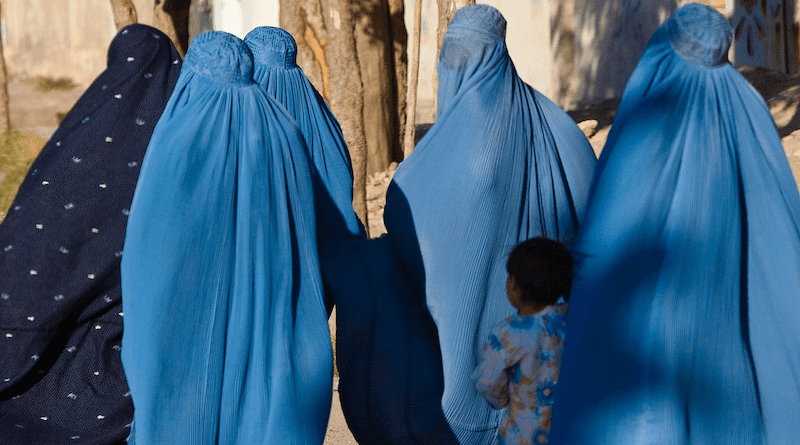Systemic Oppression: The Taliban’s Assault On Afghan Women’s Rights – OpEd
By Nadir Ali
Afghanistan’s current state of affairs poses many complications for women, especially in the areas of politics and society. Women’s rights are blatantly violated, and their overall development is hindered by violence against them, making it a serious cause for concern.
This violence takes many different forms; it can be physical, as in beatings and burnings, or psychological, as in coercion and manipulation. However, women’s reliance and limited participation in family decision-making processes uphold their subservient status and rendering them to additional abuse and exploitation. The well-being, health, and socio-economic status of women are significantly impacted by these injustices, despite the fact that they are frequently accepted in Afghan society.
However, Afghan women still have to navigate a precarious reality dominated by deeply ingrained cultural norms and traditional beliefs, even in the face of significant legislative reforms and the implementation of gender-sensitive initiatives. The challenges faced by women have been made worse by the Taliban’s resurgence. The group has been imposing restrictions on women’s access to education and employment opportunities, thereby undoing decades’ worth of hard-won rights. A new era of geopolitical rivalry has begun with the US withdrawal from Afghanistan, with regional powers fighting for influence and control over strategic interests. This change in dynamics highlights how intricately geopolitical forces interact and how vulnerable Afghan women are in the middle of these power struggles. Also, a new and dark chapter of flagrant violations of human rights, especially against women and girls, has been brought about by the Taliban’s reappearance in Afghanistan. In a matter of months, decades of progress have been unconcluded by the erosion of women’s rights and gender equality, which highlights a worrying regression.
Meanwhile, the pressure from the international community to respect women’s rights has increased, particularly in light of the suspension of vital funding for Afghanistan. Nonetheless, the harsh reality that Afghan women must now face is highlighted by the Taliban’s recent actions, which have included restricting their freedom of movement and access to public areas. Simultaneously, the Taliban’s return is a reflection of their obligation to Pashtun nationalism and a strict interpretation of religious doctrine, which further marginalises and dehumanizes women. Currently, women and girls are more vulnerable in Afghanistan because of the country’s current political and economic unrest. Women are frequently the ones who suffer the most during challenging times, as they are more vulnerable to abuse and exploitation and have fewer opportunities and resources available to them.
The systemic discrimination and oppression against women that have intensified under Taliban rule threaten to do irreparable harm to the country. The Taliban government is aggressively institutionalizing laws that support widespread violence and discrimination against women and girls on the basis of gender. Therefore, Afghanistan now has the lowest rankings for gender equality and human rights due to this worrying trend and the upholding of patriarchal norms. The situation of Afghan women is made worse by instances of public humiliation that are coordinated by the illiterate religious police of the Taliban. By using loudspeakers that are either affixed to cars or placed in the middle of crowds, these enforcers scrutinize women and their male guardians based on things like shoe color and attire selections. Such actions deprive women of their dignity, instill fear, and strengthen societal discrimination against women based on their gender.
Therefore, the Taliban has issued multiple decrees that restrict women’s and girls’ basic rights to freedom of expression, autonomy, employment, and education, even though they initially promised to protect women’s rights within the framework of so called Sharia law. Those who dare to protest for their rights in Afghanistan face physical abuse, threats, and arrest. Prominent advocates for women’s rights record incidents of coerced unions, arbitrary detentions, child marriage, and sexual assaults. In these years, Afghan women’s lives have experienced a significant upheaval that has led to the loss of basic freedoms such as the right to wear whatever they choose, go outside their homes, seek employment of their choice, or attend school. In one fell swoop, twenty years of progress have been destroyed. Even in the face of countless obstacles, Afghan women continue to hold onto hope and maintain their autonomy over their own lives.
Last but not least, the lives of Afghan women were drastically altered when the Taliban came to power. It felt as though they were placed under house arrest with no way out. They lost everything, including their jobs, public personas, access to healthcare, and education. Their freedom and any remaining voice were also taken away, and they faced horrendous penalties for pushing too far, including public whippings, hangings, and beatings. The Taliban made minimal changes in response to international criticism. They seemed to be making little to no changes in an attempt to appease the global community.

